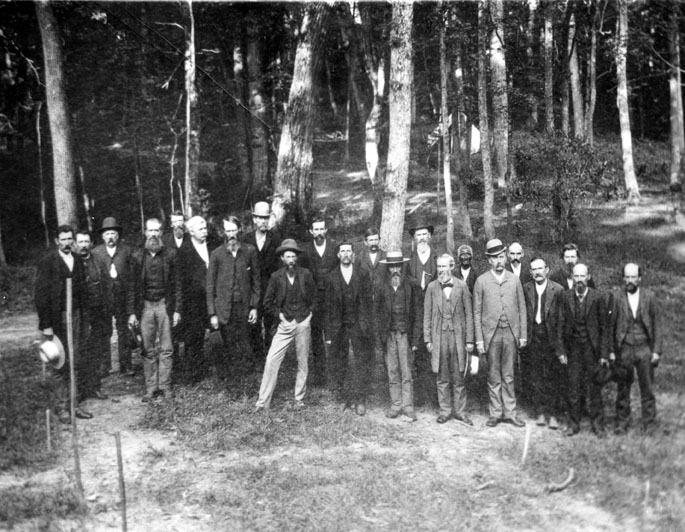In the summer of 1862, Union and Rebel armies clashed near Richmond, Va., the Confederate capital. Later named the Seven Days Battles, both sides suffered massive losses. Union Gen. George B. McClellan reported an estimated 16,000 casualties; meanwhile, Confederate Gen. Robert E. Lee lost roughly 19,000 soldiers to injury or death.
Though fighting occurred nearly 400 miles away from Asheville, local residents eagerly awaited news. “We have received no statement of the killed and wounded in the late battles near Richmond,” the Asheville News reported on July 10, 1862. “Knowing the anxiety of the people of this section to hear from our Western Regiments, we have made every effort to procure a list of the casualties, but without success.”
The paper did, however, include the transcript of a letter written by Confederate soldier G.W. Candler. Dated July 2, 1862, he described the final evening of the weeklong battle:
“I sat on the ground last night half the night, two miles East of the City, listening to the roar of the cannon. It was like the continual bellowing of a dreadful thunder storm. The Heavens were illuminated over the battle-field. It was grand, awful and sublime in the extreme. … The slaughter is dreadful on both sides. Such devastation of human beings has never been known in America since white men entered it. What was before we do not know.
“I do not exaggerate, for I am calm, and speak the words of soberness and truth. The picture is only a dim representation of the substance. I cannot give the particulars. It would require 100 sheets. North Carolina, East, West and middle, has suffered severely. Our friends may prepare themselves for a report of casualties.”
By July 17, 1862, the Asheville News reported that the state lost 4,000 men during the Seven Days Battles. “Buncombe blood flowed freely, and many of our gallant boys are among the slain,” the newspaper declared.
A separate article in the same day’s paper offered additional details about the Confederate’s 14th Regiment, which included a group of soldiers known as the “Rough and Ready Guards.” Over 100 of these fighters hailed from Buncombe County.
“The 14th has been on the field all the time, constantly exposed to danger, and on two occasions has been thrown into the fiercest of the contest,” the correspondence read. “I regret to announce that it has been dreadfully cut up. Out of about 250 in the engagement 115 are killed, wounded, and missing — a great many of whom are mortally wounded.”
Updates on the dead, injured and lost continued to trickle in. One particular report, published by the Asheville News on July 31, 1862, captures the uncertainty and desperation that many families faced in the midst of war. The paper wrote:
“W.W. Weaver, son of Rev. John S. Weaver, of this county, reported mortally wounded, has not since been heard of, although his father spent many days in and around Richmond in search of him. The opinion of his comrades is that [his] wound was not so serious as at first reported, and that he fell into the hands of the enemy. We trust he may yet be found. He was a most estimable young man.”
The article concluded: “Every section, and almost every neighborhood of our country is feeling the ravages of war.”




My double great grandfather Maj. Thomas Casey Westall served in the home guard in the Asheville areas and saw little serious fighting. He did name his son, my great grandfather (born in Sep 1861) James Manassas Westall in honor of the major Confederate victory at 1st Manassas / Bull Run the previous month. TC Westall was also the maternal grandfather of Thomas Wolfe, the writer. His brother Noble Bachus Westall was a Sgt in an NC regiment that saw brutal fighting in Chancellorsville, Gettysburg, and the Wilderness among other places.. Uncle Bachus survived the war and and my dad remembered meeting him in the early 1920’s. TC rests in the Westall area at Riverside Cemetery and NB, his first wife, and half of his children who did not survive to adulthood rest in a private cemetery above Rice Branch road near the end of Beaverdam valley where NB once owned a mountainside farm